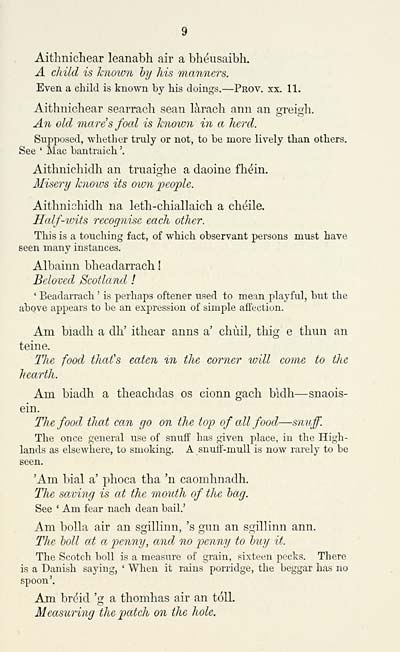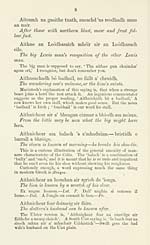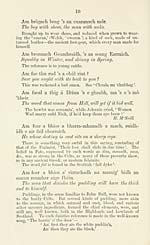Download files
Complete book:
Individual page:
Thumbnail gallery: Grid view | List view

Aithnichear leanabh air a bheusaibh.
A child is known by his manners.
Even a child is known by his doings. — Prov. xx. 11.
Aithnichear searrach sean làrach ann an greigh.
An old mares foal is known in a herd.
Supposed, whether truly or not, to be more lively than others.
See ' Mac bantraich '.
Aithnichidh an truaighe a daoine fh^in.
Misery knows its own people.
Aithnichidh na leth-chiallaich a cheile.
Half-wits recognise each other.
This is a touching fact, of which observant persons must have
seen many instances.
Albainn bheadarrach !
Beloved Scotland !
' Beadarrach ' is perhaps oftener used to mean playful, but the
above appears to be an expression of simple affection.
Am biadh a dh' ithear anns a' chùil, thig e thnn an
teine.
TJie food that's eaten %n the corner will come to the
hearth.
Am biadh a theachdas os cionn gach bidh — snaois-
ein.
The food that can go on the top of all food — snuff.
The once general use of snuff has given place, in the High-
lands as elsewhere, to smoking. A snuff-mull is now rarely to be
seen.
'Am bial a' phoca tha 'n caomhnadh.
The saving is at the mouth of the hag.
See ' Am fear nach dean bail.'
Am bolla air an sgillinn, 's gun an sgillinn ann.
The loll at a penny, and no pienny to buy it.
The Scotch boll is a measure of grain, sixteen pecks. There
is a Danish saying, ' When it rains porridge, the beggar has no
spoon'.
Am br^id 'g a thomhas air an toll.
Measuring the patch on the hole.
A child is known by his manners.
Even a child is known by his doings. — Prov. xx. 11.
Aithnichear searrach sean làrach ann an greigh.
An old mares foal is known in a herd.
Supposed, whether truly or not, to be more lively than others.
See ' Mac bantraich '.
Aithnichidh an truaighe a daoine fh^in.
Misery knows its own people.
Aithnichidh na leth-chiallaich a cheile.
Half-wits recognise each other.
This is a touching fact, of which observant persons must have
seen many instances.
Albainn bheadarrach !
Beloved Scotland !
' Beadarrach ' is perhaps oftener used to mean playful, but the
above appears to be an expression of simple affection.
Am biadh a dh' ithear anns a' chùil, thig e thnn an
teine.
TJie food that's eaten %n the corner will come to the
hearth.
Am biadh a theachdas os cionn gach bidh — snaois-
ein.
The food that can go on the top of all food — snuff.
The once general use of snuff has given place, in the High-
lands as elsewhere, to smoking. A snuff-mull is now rarely to be
seen.
'Am bial a' phoca tha 'n caomhnadh.
The saving is at the mouth of the hag.
See ' Am fear nach dean bail.'
Am bolla air an sgillinn, 's gun an sgillinn ann.
The loll at a penny, and no pienny to buy it.
The Scotch boll is a measure of grain, sixteen pecks. There
is a Danish saying, ' When it rains porridge, the beggar has no
spoon'.
Am br^id 'g a thomhas air an toll.
Measuring the patch on the hole.
Set display mode to: Large image | Transcription
Images and transcriptions on this page, including medium image downloads, may be used under the Creative Commons Attribution 4.0 International Licence unless otherwise stated. ![]()
| Early Gaelic Book Collections > Blair Collection > Collection of Gaelic proverbs and familiar phrases > (49) |
|---|
| Permanent URL | https://digital.nls.uk/76277829 |
|---|
| Description | A selection of books from a collection of more than 500 titles, mostly on religious and literary topics. Also includes some material dealing with other Celtic languages and societies. Collection created towards the end of the 19th century by Lady Evelyn Stewart Murray. |
|---|
| Description | Selected items from five 'Special and Named Printed Collections'. Includes books in Gaelic and other Celtic languages, works about the Gaels, their languages, literature, culture and history. |
|---|

